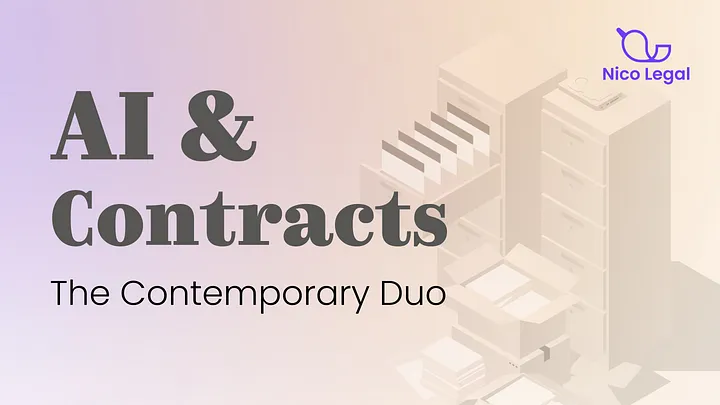![]()
Wait! Before You Go…
Stay connected and get the latest insights in contract management!
Visit our LinkedIn Page to join a community of professionals and stay updated on industry trends, best practices, and expert tips from Contractmanagement.online.
![]()
![]()

Providing the oars to navigate the treacherous waters of contract management
According to the Harvard Business Law Review, it has been estimated that inefficient contracting results in firms losing between 5% — 40% of value on a given deal. Thus, AI could constitute the next phase in the evolution of contracts from paper-based contracts to online word documents and PDFs by circumventing the losses that law firms and legal practitioners face when they manage contracts. Hence, while AI is often placed on the side-lines due to its alleged uncertainty, AI has become common-place in today’s society, which is a growth that the legal field must be kept abreast of.

For decades, contracts were drafted using the trusted pen and paper, with the oldest contract being written on stone tablets. However, despite its origins, contracts have evolved throughout the course of history. However, with the birth of the internet in around 1983, contracts stored as PDFs and Word Documents gradually became a common place in the world. Thus, with regard to contract management, Hence, AI constitutes the next phase in circumventing challenges related to contracts. While the legal field is steeped in tradition, with its loyalty to paper based documents, for the affirmation of legal certainty, as a case could be won or lost based on the wordings of a contract. However, another reality that cannot be forgotten is the rise of AI, which is similar to the rise of the internet, especially for law firms, and legal practitioners involved in the commercial field which involves contractual disputes.
The incorporation of AI into contract management does not stem from a notion of keeping up with the trends, but rather that of necessity. Law firms are primarily faced with the issue of having to deal with a sheer volume of contract which they must keep track. While there are often teams of lawyers who peruse through these documents and organises them, since the subject matter is not uniform, the process of managing and updating such documents is a tedious and time consuming task. For instance, this is prevalent when looking into complex outsourcing agreements or the manner in which certain clauses are worded across different divisions.
Beverly Rich in ‘How AI is changing contracts?’ had emphasised these aforementioned processes requires immense manpower as the stages of drafting and execution are tedious. However, he then references his research which analysed the impact of advanced software with AI capabilities being used by a small number of firms. These law firms, which had a high volume of contracts that needed to be managed, saw an increase in productivity and efficiency in their contracting when they incorporated AI. AI has the ability to automate the entire contract review process by being able remove repetitive grunt work, which is work that takes a longer time involving many employees. Therefore, AI, when incorporated into the management of contracts throughout their life cycle would be complementary toward the legal practitioners and law firms.
AI can find contracts, even if they are in different languages, which means that when foreign clients come to law firms, it makes it easier to track such contracts. AI has the capacity to be able to learn on its own by recognizing the patterns and key variables involved in a contract. This includes variables such as clauses, dates, parties etc… which means that a legal firm using this AI would be able to keep themselves updated on the contents of numerous contracts. Further, this also includes the benefit of a firm-specified criteria when perusing through a large volume of contracts, which enables AI to be catered toward the requirements of each law firm or legal practitioner. Therefore, the storage and organisation of contracts would complement legal tasks for law firms and legal practitioners amidst the heavy workload that is placed on them on a day to day basis.
AI has the capacity to swiftly review and analyse contracts by identifying key terms and clauses, and flagging any potential risks or issues. For instance, Thomson Reuters’s (2023) Document Intelligence is a powerful tool that swiftly extracts relevant information from extensive document collections, comprising hundreds or even thousands of files, in a matter of minutes. Thomson Reuters Practical Law’s team of attorney editors has trained Document Intelligence to recognize contract types, specific contract clauses, and terms. Additionally, it can efficiently capture crucial data such as payment details and dates related to obligations, ensuring the reliability of your extracted information. Rather than relying on basic keyword searches, this tool provides exceptionally accurate results by considering the context and intent within the text itself. With answers delivered almost instantly, users experience a more than 50% increase in the speed of information retrieval and review.
The usage of AI in contract management also includes another benefit of complimenting the legal skillset of the lawyers involved in addition to the workflow. Professor Gillian K. Hadfield, a law professor at the University of Southern California who specialises in contract law, believes that AI in contracting will lead to a better use of legal talent: “lawyers will shift their focus from routine activities to much more high value work involved in shaping strategies and navigating complex legal problems.”
For instance, lawyers would be able to spend more time assessing risk and providing counsel instead of document reviewing. Further, instead of having a large team of associates conduct due diligence before a deal, companies will have a smaller, more agile team review the documents that the software flags and then offer advice. Therefore, with the incorporation of AI, lawyers would not be fired, but rather, equipped with new skills and tools to be able to cope with the continuous flow of contracts in an efficient manner as lawyers spend up to 40–60% of their time drafting and reviewing contracts.
The central thrust of AI in the legal field is the provision of the means to understand legal jargon and democratise citizens relationships contracts. As much as reviews are essential for contract management, review is not the end goal, but rather, interpreting and explaining such contracts and their terms to a client is equally, if not more, important. This stage requires a lawyer’s capacity to translate legal language into business language and to assess risks, which is a subjective task. Hence, when AI automates the more tedious parts of the process contract management as discussed above, then legal practitioners have more time to tend to this task of liasoning of clients.
The capacity for legal practitioners and law firms to be updated with the trends and statistics of contracts enables both a competitive edge and a higher quality of service for clients. AI-powered software has the capacity to provide insights into trends, patterns and opportunities by analysing contract data. The benefit of such information is that it provides the ability for law firms or legal practitioners to make better, and more informed decisions with regard to contract negotiations, pricing and risk management.
In conclusion, the age of AI is not too dissimilar to the age of the internet. Often, the pushback from incorporating such advancements is the uncertainty of change. However, for legal practitioners and law firms, the consistent inflow of contracts constitutes a tedious task that may often threaten to drown the efficiency they maintain on a daily basis. AI aims to complement and thereby constitute a necessity element, rather than sticking with the trends, by providing the tools law firms and legal practitioners to navigate such waters.
Author: Nico Legal
Effective contract management is a challenge for virtually all organisations. Whilst larger, more mature enterprises tend to have dedicated procurement teams to handle performance of contracts, this is not the...
Contract Lifecycle Management (CLM) is about more than just storing contracts; it’s a key driver of business efficiency. Integrating AI and automation into CLM can completely revolutionize how contracts are...
In today’s digital landscape, data has become one of the most valuable assets for businesses. However, with great value comes great responsibility. Ensuring robust data protection measures in contracts is no...